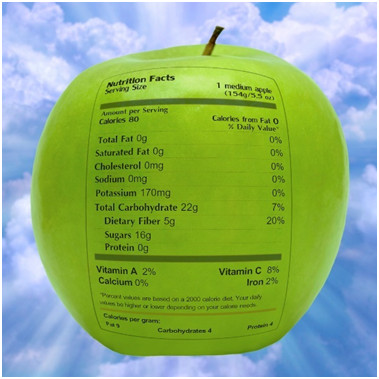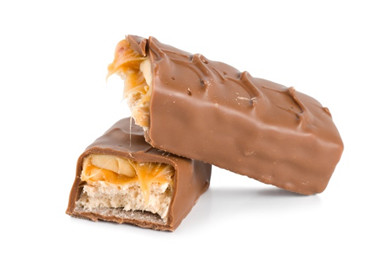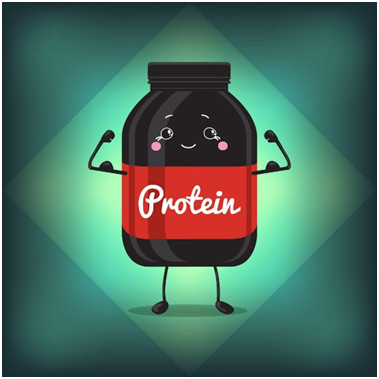Is It The Sugar, Or Is It The Food?
Author: Dr. Stephen Chaney
Should we avoid sugar completely? Almost every expert agrees that Americans should cut down on the amount of sugar we are consuming. However, for some people this has become a “sugar phobia”. They have sworn that “sugar shall never touch their lips”. Not only do they avoid sugar sweetened sodas and junk food, but they also have become avid label readers. They scour the label of every food they see and reject foods they find any form of sugar listed as an ingredient. Is this degree of sugar avoidance justified?
Should We Avoid Sugar to Keep it From Killing Us?
Let me add some perspective:
- If you just take studies about the dangers of sugar at face value, sugar does, indeed, look dangerous. Excess sugar consumption is associated with increased risk of obesity, diabetes, and heart disease. However, when you look a little closer, you find that most of these studies have been done by looking at the correlation of each of these conditions with sugar sweetened beverage consumption (sodas and fruit juices).
A few studies have looked at the correlation of obesity and disease with total “added sugar” consumption. However, 71.6% of added sugar in the American diet comes from sugar sweetened beverages and junk food. None of the studies have looked at the sugar from healthy foods like fruits, vegetables, and whole grains. That’s because there is ample evidence that these foods decrease the risk of obesity, diabetes, and heart disease.
- For example, if apples had a nutrition label, it would list 16 grams of sugar in a medium 80 calorie apple, which corresponds to about 80% of the calories in that apple. The sugar in an apple is about the same proportion of fructose and glucose found in high fructose corn syrup. Apples are not unique. The nutrition label would read about the same on most other fruits. Does that mean you should avoid sugar from all fruits? I think not.
Avoid Sugar or Avoid Certain Foods
 The obvious question is: “Why are the same sugars, in about the same amounts, unhealthy in sodas and healthy in fruits?” Let’s go back to those studies I just mentioned—the ones that are often used to vilify sugars. They are all association studies, the association of sugar intake with obesity and various diseases.
The obvious question is: “Why are the same sugars, in about the same amounts, unhealthy in sodas and healthy in fruits?” Let’s go back to those studies I just mentioned—the ones that are often used to vilify sugars. They are all association studies, the association of sugar intake with obesity and various diseases.
The weakness of association studies is the association could be with something else that is tightly correlated with the variable (sugar intake) that you are measuring. Could it be the food that is the problem, not the sugar?
If we look at healthy foods (fruits, vegetables, whole grains) they are chock full of vitamins, minerals, phytonutrients, fiber, and (sometimes) protein. Fiber and protein slow the absorption of sugar into the bloodstream. As a result, blood sugar levels rise slowly and are sustained at relatively low levels for a substantial period of time.
In sodas there is nothing to slow the absorption of blood sugar. You get rapid rise in blood sugar followed by an equally rapid fall. The same is true of junk foods consisting primarily of sugar, refined flour and/or fat. Avoid sugar from those types of foods.
Another consideration is something called caloric density. Here is a simple analogy. I used to explain the concept of caloric density to medical students in my teaching days. There are about the same number of calories in a 2-ounce candy bar and a pound of apples (around 278 in the 2-ounce candy bar and 237 in a pound of apples). You can eat a 2-ounce candy bar and still be hungry. If you eat a pound of apples you are done for a while. In this example, the 2-ounce candy bar had a high caloric density (a lot of calories in a small package). Perhaps a more familiar terminology would be the candy bar was just empty calories.
Are Sodas and Junk Foods Killing Us?
 Putting all that together, you can start to understand why the foods the sugars are in are more important than the sugars themselves. When you consume sugars in the form of sugar sweetened beverages or sugary junk foods, your appetite increases. We don’t know for sure whether it is the intense sweetness of those foods, the rapid increase and fall in blood sugar, or the high caloric density (lots of calories ina small package) that makes us hungrier. It doesn’t matter. We crave more food, and it isn’t usually fruits, vegetables, and complex carbohydrates we crave. It’s more junk. That sets in motion a predictable sequence of events.
Putting all that together, you can start to understand why the foods the sugars are in are more important than the sugars themselves. When you consume sugars in the form of sugar sweetened beverages or sugary junk foods, your appetite increases. We don’t know for sure whether it is the intense sweetness of those foods, the rapid increase and fall in blood sugar, or the high caloric density (lots of calories ina small package) that makes us hungrier. It doesn’t matter. We crave more food, and it isn’t usually fruits, vegetables, and complex carbohydrates we crave. It’s more junk. That sets in motion a predictable sequence of events.
- We overeat. Those excess calories are stored as fat and we become obese. [Note: The low carb enthusiasts will tell you our fat stores come from carbohydrates alone. That is incorrect. All excess calories, whether from protein, fat, or carbohydrate, are stored as fat.]
- It’s not just the fat you can see (belly fat) that is the problem. Some of that fat builds up in our liver and muscles. This sets up an unfortunate sequence of metabolic events.
- The fat stores release inflammatory cytokines into our bloodstream. That causes inflammation. Inflammation increases the risk of many diseases including heart disease and cancer.
- The fat stores also cause our cells to become resistant to insulin. That reduces the ability of our cells to take up glucose, which leads to hyperglycemia and type 2 diabetes. [Note: The low carb enthusiasts will tell you carbohydrates cause type 2 diabetes. That is also incorrect. It is our fat stores that cause insulin resistance and type 2 diabetes. Our fat stores come from all excess calories, not just excess calories from carbohydrates.]
- Insulin resistance also causes the liver to overproduce cholesterol and triglycerides and pump them into the bloodstream. That increases the risk of heart disease.
- Sugar sweetened beverages and sugary junk foods also displace healthier foods from our diet. That leads to potential nutrient shortfalls that can increase our risk of many diseases.
However, none of this has to happen. The one thing that every successful diet has in common is the elimination of sodas, junk foods, fast foods and convenience foods. You should avoid sugar from those foods as much as possible. Once you eliminate those from your diet,you significantly enhance your chances of being at a healthy weight and being healthy long term.
What About Protein Supplements And Similar Foods?
Of course, the dilemma is what you, as an intrepid label reader, should do about protein supplements, meal replacement bars, or snack bars. They are supposed to be healthy, but the label lists one or more sugars. Even worse, the sugar content is higher than your favorite health guru recommends. So, should you avoid sugar from supplements and the like?
In this case, a more useful concept is glycemic index, which is a measure of the effect of the food on your blood sugar levels. Healthy foods like apples may have a high sugar content, but they havea low glycemic index.
 The same is true for the protein supplements and bars you are considering. Rather than looking at the sugar content, you should be looking for the term “low glycemic” on the label. That means there is enough fiber and protein in the food to slow the absorption of sugar into the bloodstream and stabilize your blood sugar levels.
The same is true for the protein supplements and bars you are considering. Rather than looking at the sugar content, you should be looking for the term “low glycemic” on the label. That means there is enough fiber and protein in the food to slow the absorption of sugar into the bloodstream and stabilize your blood sugar levels.
What Does This Mean For You?
Don’t misunderstand me. I am not advocating for unlimited consumption of sugar. We should work on ways to avoid sugar or reduce the amount of sugar in our diet. On the other hand, we don’t need to become so strict that we and our family need to eat foods that taste like cardboard. We also don’t want to replace natural sugars with artificial sweeteners. I have warned about the dangers of artificial sweeteners previously.
We can go a long way towards reducing sugar by just eliminating sodas, other sugar sweetened beverages, junk foods, fast foods, convenience foods, and pastries from our diet. When considering fast foods and convenience foods, we should check the label for hidden sugar. For example, some Starbucks drinks are mostly sugar. When considering foods that are supposed to be healthy, we should look for the term “low glycemic” on the label.
So we don’t have to avoid sugar completely, but we should reduce sugar from sugar sweetened beverages and junk food.
The Bottom Line
We need to keep warnings about the dangers of sugar in perspective:
- The studies showing that sugar consumption leads to obesity, diabetes, and heart disease have all been done with sodas and junk foods.
- Many fruits have just as much sugar as a soda. They also contain about the same proportion of fructose and glucose as high fructose corn syrup. Yet we know fruits are good for us.
- Diets rich in fruits, vegetables and whole grains decrease our risk of obesity, diabetes, and heart disease.
- That is because the sugar in whole foods is generally present along with fiber and protein, which slows the absorption of sugar and prevents the blood sugar spikes we get with sodas and junk foods.
- In the case of prepared foods like protein supplements, you should look for “low glycemic” on the label rather than sugar content. Low glycemic means that there is enough fiber and protein in the product to slow the absorption of sugar and prevent blood sugar spikes.
- Don’t misunderstand me. I am not advocating for unlimited consumption of sugar. We should all work on ways to avoid sugar from junk foods or to reduce the amount of sugar in our diet. On the other hand, we don’t need to become so strict that we and our family need to eat foods that taste like cardboard. We also don’t want to replace natural sugars with artificial sweeteners.
- We can go a long way towards reducing sugar by just eliminating sodas, other sugar sweetened beverages, junk foods, fast foods, convenience foods, and pastries from our diet. When considering fast foods and convenience foods, we should check the label for hidden sugar. When considering foods that are supposed to be healthy, we should look for the term “low glycemic” on the label.
For more details, read the article above.
These statements have not been evaluated by the Food and Drug Administration. This information is not intended to diagnose, treat, cure or prevent any disease.
